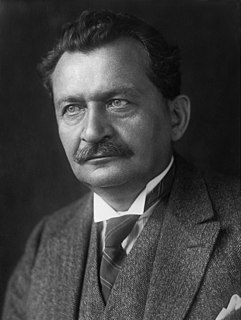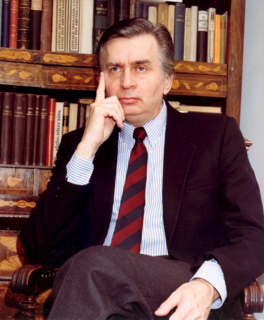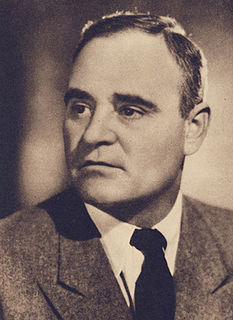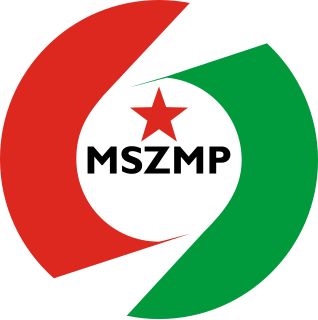
The Hungarian Workers' Party is a communist party in Hungary led by Gyula Thürmer. Established after the fall of the communist Hungarian People's Republic, the party has yet to win a seat in the Hungarian parliament. Until May 2009 it was a member of the Party of the European Left.

Bulgaria elects on national level a head of state - the president - and a legislature. The president is elected for a five-year term directly by the people. The National Assembly has 240 members, elected for a four-year term by proportional representation in multi-seat constituencies with a 4% threshold. Bulgaria has a multi-party system, in which no one party often has a chance of gaining power alone, and parties must work with each to form governments.
Parliamentary elections were held in Albania on 3 July 2005. The result was a victory for the opposition Democratic Party (PD) and its allies, prominently the Republican Party (PR). Former president Sali Berisha became prime minister as a result of the election. Voter turnout was only 48.0%.

The Christian Democratic People's Party is a Christian-democratic political party in Hungary. It is officially a coalition partner of the ruling party, Fidesz, but is in reality a satellite party of Fidesz and has been unable to get into the Parliament on its own since 2006. For several elections prior to the pact, they had been unable to pass the election threshold of 5% of the vote. Without Fidesz, its support cannot be measured, and even a leading Fidesz politician, János Lázár, stated that Fidesz does not consider the government to be a coalition government.

Federal elections were held in Germany on 14 September 1930. Despite losing ten seats, the Social Democratic Party of Germany (SPD) remained the largest party in the Reichstag, winning 143 of the 577 seats, while the Nazi Party (NSDAP) dramatically increased its number of seats from 12 to 107. The Communists also increased their parliamentary representation, gaining 23 seats and becoming the third-largest party in the Reichstag.

A constitutional referendum was held in France on 5 May 1946. Voters were asked whether they approved of a new draft Constitution proposed by the Constituent Assembly elected in 1945.

The 1990 Hungarian parliamentary elections were held in Hungary on 25 March 1990, with a second round of voting taking place in all but five single member constituencies on 8 April. They were the first completely free and competitive elections to be held in the country since 1945, and only the second free elections in the country's history. The conservative, nationalist Hungarian Democratic Forum (MDF) beat the liberal and more internationalist Alliance of Free Democrats, which had spearheaded opposition to Communist rule in 1989, to become the largest party in parliament. The Hungarian Socialist Party, the former Communist party, suffered a crushing defeat, winning only 33 seats for fourth place.
The Hungarian Round Table Talks were a series of formalized, orderly and highly legalistic discussions held in Budapest, Hungary in the summer and autumn of 1989, inspired by the Polish model, that ended in the creation of a multi-party constitutional democracy and saw the Communist Party lose its 40-year grip on power.

Parliamentary elections were held in Hungary between 8 and 15 December 1926. The result was a victory for the Unity Party, which won 161 of the 245 seats in Parliament. István Bethlen remained Prime Minister.

Parliamentary elections were held in Hungary on 16 November 1958. They were the first elections held after the Hungarian Revolution of 1956. The Communist Hungarian Working People's Party had been reorganized as the Hungarian Socialist Workers' Party, under the leadership of a more moderate Communist, János Kádár. However, as was the case during the era of Mátyás Rákosi, voters were presented with a single list of Communists and pro-Communist independents. The Socialist Workers' Party won 276 of the 338 seats, with the remaining 62 going to independents.

Parliamentary elections were held in Hungary on 19 March 1967. The Hungarian Socialist Workers' Party was the only party to contest the elections, and won 259 of the 349 seats, with the remaining 90 going to independents selected by the party. Of the 349 constituencies, only nine had more than one candidate.

Parliamentary elections were held in Hungary on 25 April 1971. The Hungarian Socialist Workers' Party was the only party to contest the elections, and won 224 of the 352 seats, with the remaining 128 going to independents selected by the party. Of the 352 constituencies, only 49 had more than one candidate.

Parliamentary elections were held in Hungary on 15 June 1975. The Hungarian Socialist Workers' Party was the only party to contest the elections, and won 215 of the 352 seats, with the remaining 137 going to independents selected by the party. Of the 352 constituencies, only 34 had more than one candidate.

Parliamentary elections were held in Hungary on 8 June 1980. The Hungarian Socialist Workers' Party was the only party to contest the elections, and won 252 of the 352 seats, with the remaining 100 going to independents selected by the party. Of the 352 constituencies, only fifteen had more than one candidate.

Parliamentary elections were held in Hungary on 8 June 1985. The Hungarian Socialist Workers' Party was the only party to contest the elections, and won 288 of the 387 seats, with 98 of the remaining 99 going to independents selected by the party, whilst one seat remained unfilled until the following year.

Parliamentary elections were held in Romania on 5 March 1961. Voters were presented with a single list from the People's Democratic Front, which was dominated by the Romanian Workers Party. The Front won all 465 seats in the Great National Assembly.

Parliamentary elections were held in Romania on 7 March 1965. Voters were presented with a single list from the People's Democratic Front, which was dominated by the Romanian Workers Party. The Front won 465 seats in the Great National Assembly.

Parliamentary elections were held in Romania on 9 March 1975. The Front of Socialist Unity, dominated by the Romanian Communist Party and including other mass organisations, was the only organisation that contested the election. No prospective candidate could run for office without the Front's approval. The Front won all 349 seats in the Great National Assembly.

Parliamentary elections were held in Romania on 9 March 1980. The Front of Socialist Unity and Democracy, dominated by the Romanian Communist Party and including other mass organisations, was the only organisation that contested the election. No prospective candidate could run for office without the Front's approval. The Front won all 369 seats in the Great National Assembly.

Parliamentary elections were held in Romania on 17 March 1985. The Front of Socialist Unity, dominated by the Romanian Communist Party and including other mass organisations, was the only organisation that contested the election. No prospective candidate could run for office without the Front's approval. The Front won all 369 seats in the Great National Assembly. These would be the last single-party elections held in Romania; the Communists would be overthrown four years later.













